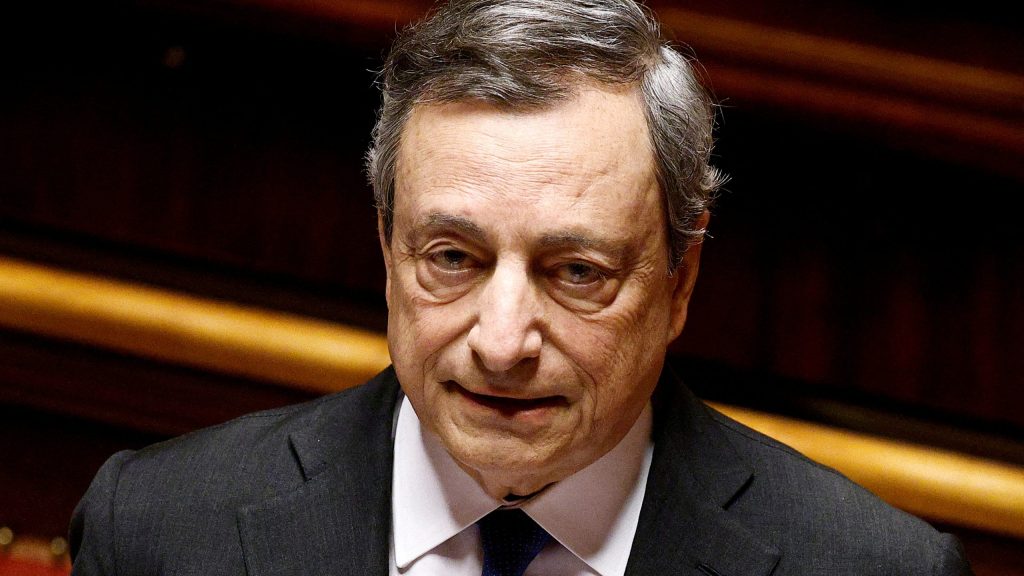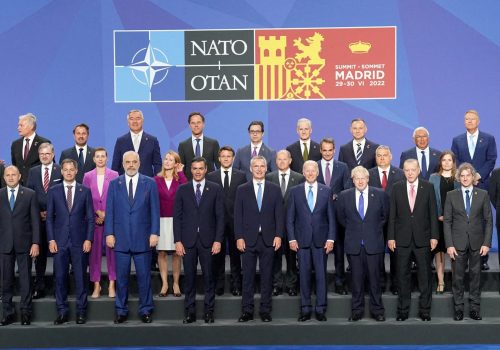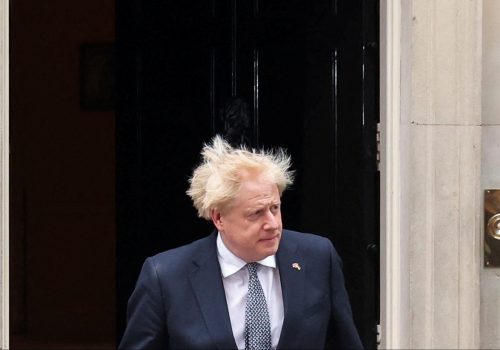Following days of political turmoil, Mario Draghi resigned from his post as Italy’s prime minister Thursday—sending shockwaves through a European political establishment whose very stability he helped ensure.
Draghi’s resignation, which triggered a snap election likely to take place in September, sends Italy into a new period of political instability and throws into question its economic recovery and leading role in responding to Russian aggression. “This is Europe’s hour and we must seize it,” Draghi said in May when the Atlantic Council honored him with a Distinguished Leadership Award.
Who will seize the moment now? We asked Atlantic Council experts Karim Mezran, a Libyan-Italian scholar and director of the North Africa Initiative at the Rafik Hariri Center and Middle East Programs, and Frances Burwell, a distinguished fellow at the Europe Center, to weigh in on what’s next for Europe.
Draghi’s resignation has been widely cast as a destabilizing development for Europe. Why is that?
Mario Draghi’s resignation presents huge risks for Italy, Europe, and the transatlantic coalition supporting Ukraine. Under Draghi, Italy has become much more influential within Europe; for the first time in years, it has not been the object of European Union (EU) concerns but a leader within EU circles. As Europe heads into an energy crisis and the euro sinks, simply having Draghi in EU leadership circles would have been reassuring, as he would have brought good advice to the European Council. He has also been a strong supporter of Ukraine at key moments, including being an early advocate for giving the country EU candidate status.
—Fran
As a former president of the European Central Bank, Draghi is a prestigious manager who had the capacity to help Italy through turbulent times. Draghi is seen by many—both within Italy and the eurozone more broadly—as a uniting and strong figure with the financial, political, and economic know-how to avoid the economic disasters that may come as the two-year-old pandemic continues to throw supply chains out of whack. Let’s also not forget that Italy is the third-largest economy in the European Union after Germany and France. So a destabilized Italy will certainly destabilize the entire European Union.
—Karim
Italy under Draghi has been a staunch supporter of Ukraine amid its war with Russia. Could that change?
There are those on the right, including [former Prime Minister] Silvio Berlusconi and [former Interior Minister] Matteo Salvini, who have close ties to Russia and Russian President Vladimir Putin. A right-wing government in Rome could have a significant negative effect on Europe’s continuing military aid to Ukraine and sanctions against Moscow. It is also hard to ignore that this government crisis was triggered by the populist Five Star Movement, which has been opposed to Italy’s strong support for Ukraine. Draghi was not ousted by an erosion of public support for his government—but by crass political maneuvering among Italy’s political factions. The ultimate beneficiary may well be Vladimir Putin.
—Fran
Of course it could—and some actually have gone so far as to say that pro-Russian political forces in Italy orchestrated Draghi’s collapse. The Five-Star Movement and Lega parties are the two most pro-Putin parties in Italy, and are also the ones responsible for the collapse of the Draghi government.
—Karim
And on the economic front? What does it mean for both Italy and the EU to lose an experienced manager during a time of such economic turmoil?
Current polling indicates that there is a real possibility of a right-wing government and a far-right prime minister coming to power. Many of these parties have no solid track record of successful economic management and are more than willing to use Euroskeptic rhetoric if it advances their political fortunes. This is unlikely to be constructive in Italy’s negotiation with the European Commission over more than two hundred billion dollars in pandemic recovery aid.
—Fran
It could well be a disaster. Italy is set to receive additional funding from the EU recovery plan to help avoid a post-pandemic economic recession. But without a stable government, it becomes difficult to envision who will implement the necessary reforms and objectives set out by the EU. As of Thursday evening, the Italian stock exchange was already down 1.6 percent on the news and the euro had weakened.
—Karim
If you could offer the next Italian prime minister a piece of advice, what would it be?
My one piece of advice would be to think of Italy and the EU first, rather than their own political ambitions.
—Fran
They should exercise their influence and power to assure the European Union that Italy is a reliable and loyal partner, capable of undergoing the reforms necessary to implement the recovery plan. As for Russia and the immediate neighborhood, Italy should maintain its engagement in the pro-Ukrainian coalition and increase its involvement in the southern shore of the Mediterranean to offset the increase or continuation of a perception of US withdrawal.
—Karim
Further reading
Thu, Jun 30, 2022
Our experts decipher NATO’s new Strategic Concept
Markup By
What were the allies really saying amid all the jargon? And what did they leave out? Our experts carefully combed through the document and dropped their insights in the margins.
Fri, Jul 1, 2022
Summit speed read: How the G7 and NATO pushed back on Putin
New Atlanticist By Daniel Fried
The free world’s leading institutions did a lot this week—but the war still hangs in the balance. Here's what was agreed to and what is yet to be accomplished.
Thu, Jul 7, 2022
What does a post-Boris Britain look like?
Fast Thinking By
From both sides of the Atlantic, our experts weigh in on the next act for Great Britain.
Image: Italian Prime Minister Mario Draghi addresses the Senate ahead of a confidence vote for the government after he tendered his resignation last week in the wake of a mutiny by a coalition partner, in Rome, Italy July 20, 2022. Photo by Guglielmo Mangiapane/REUTERS



